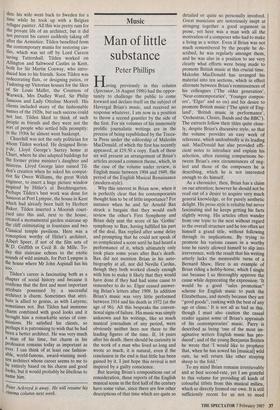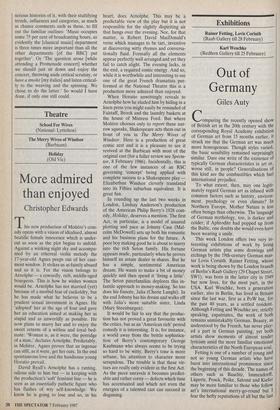Music
Man of little substance
Peter Phillips
Having previously in this column (Spectator, 16 August 1986) had the oppor- tunity to challenge the public to come forward and declare itself on the subject of Havergal Brian's music, and received no response whatever, I am now in a position to throw a second gauntlet by the side of the first. For six volumes of his immensely prolific journalistic writings are in the process of being republished by the Tocca- ta Press under the editorship of Malcolm MacDonald, of which the first has recently appeared, at £19.50 a copy. Each of these six will present an arrangement of Brian's articles around a common theme, which, in the case of the volume under review, is English music between 1904 and 1949, the period of the English Musical Renaissance (modern-style).
Why this interest in Brian now, when it is perfectly clear that his contemporaries thought him to be of little importance? For instance when he and Sir Arnold Bax struck a bargain that they would each review the other's First Symphony and Brian duly sent the score of his `Gothic' symphony to Bax, having fulfilled his part of the deal, Bax replied after some delay and prompting that he could not speak of so complicated a score until he had heard a performance of it, which ultimately only took place some years after Bax's death. Bax did not mention Brian in his auto- biography at all, nor did Neville Cardus, though they both worked closely enough with him to make it likely that they would have done if they had had some cause to remember to do so. Elgar ceased answer- ing Brian's letters after 1909. In addition Brian's music was very little performed between 1914 and his death in 1972 (at the age of 96). All this bespeaks the conven- tional signs of failure. His music was simply unknown and his writings, like so much musical journalism of any period, were obviously neither here nor there to the leading figures of the time. If, 14 years after his death, there should be curiosity in the work of a man who lived so long and wrote so much, it is natural, even if the conclusion in the end is that little has been gained by it. I just hope this revival is not inspired by a guilty conscience.
But leaving Brian's compositions out of consideration, these reports of the English musical scene in the first half of the century have some value, since there are few other descriptions of that time which are quite so detailed or quite so personally involved. Great musicians are notoriously inept at stringing together a good argument in prose, yet here was a man with all the motivation of a composer who had to make a living as a writer. Even if Brian was not much remembered by the people he de- scribed, he was regularly amongst them, and he was also in a position to see very clearly what efforts were being made to promote British music at this crucial time. Malcolm MacDonald has arranged his material into ten sections, which in effect alternate between Brian's reminiscences of his colleagues (`The older generation', `Near-contemporaries', `Younger compos- ers', `Elgar' and so on) and his desire to promote British music (The spirit of Eng- land', `British music in performance', `Orchestras, Choirs, Bands and the BBC'). The extracts follow their titles quite close- ly, despite Brian's discursive style, so that the volume provides an easy work of reference, which undoubtedly is its leading suit. MacDonald has also provided effi- cient notes to introduce and explain his selection, often running comparisons be- tween Brian's own circumstances of neg- lect and those of the composers he is describing, which he is not interested enough to do himself.
As a chronicler, then, Brian has a claim on our attention; however he should not be read out of a desire to acquire very much general knowledge, or for purely aesthetic delight. His prose style is reliable but never fascinating and he keeps getting his facts slightly wrong. His articles often wander from one topic to the next without regard to the overall structure and he too often set himself a grand title, without following through its implications. By trying to promote his various causes in a worthy tone he rarely allowed himself to slip into irreverence, with the result that his writing utterly lacks the memorable turns of a Bernard Shaw. Here is an example of Brian riding a hobby-horse, which I single out because I so thoroughly approve the cause while deprecating the expression: `It would be a good "sales promotion" scheme for English music to push the Elizabethans, and mostly because they are "good goods", ranking with the best of any age or clime.' It is not all as bad as this, though I must also caution the casual reader against some of Brian's appraisals of his contemporaries' music. Parry is described as being `one of the most im- aginative writers English music has pro- duced'; and of the young Benjamin Britten he wrote that `I would like to prophesy that, when he has sowed his [musical] wild oats, he will return like other straying sheep to the fold.'
To my mind Brian remains irretrievably and at best second-rate, yet I am grateful to this volume for providing all kinds of colourful titbits from this musical milieu, which so directly formed our own. It is still sufficiently recent for us not to need serious histories of it, with their stultifying trends, influences and categories, as much as chance comments such as these, to fill out the familiar outlines: 'Music occupies some 75 per cent of broadcasting hours, so evidently the [classical music] department is three times more important than all the other departments [of the BBC] put together'. Or 'The question arose [while attending a Promenade concert] whether we should just sit down and enjoy the concert, throwing aside critical scrutiny, or have a smoke [my italics] and listen critical- ly to the weaving and the spinning. We chose to do the latter.' So would I have done, if only one still could.



















































 Previous page
Previous page